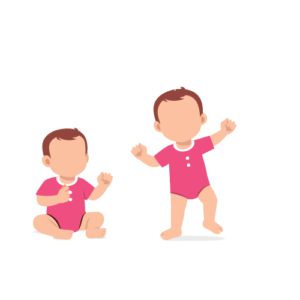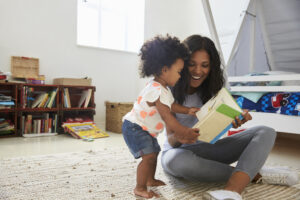The more you chat, play and read with your child, the more you'll help to build their brains. Any time, anywhere, whether at home or out and about, it all adds up. There’s no need to buy lots of toys or have big days out. Wherever you are, simply chatting back and forth, answering your child’s questions and sharing special moments together all help their brain to grow and develop secure and strong connections.
During this stage your child is continuing to develop physically and emotionally and as their independence grows they will start making their own decisions. The transformation you will see from your baby into a confident, communicating and social toddler is amazing.
 There are lots of ways to interact with your child that will help them develop.
There are lots of ways to interact with your child that will help them develop.
- Get on the same level as them.
- Follow their lead and interests.
- Pause and wait for them to show you what they’re interested in.
- Listen, watch, and respond to all forms of their communication.
- Describe their actions and consider what their thoughts and feelings might be.
- Share enjoyment through an expressive voice and body language.
- Copy or fill in whenever your child attempts to communicate.
- Use few questions, describing what’s happening instead.
- When asking questions, try to keep them open-ended.
Your child will achieve a huge number of important milestones during this year but it is important to remember that all children do so at their own pace. The milestones below will give you an idea of what progress you can expect but please do not worry if your child takes a little longer.
Between their first and second birthday, babies will be working on their:
- balance
- climbing
- running
- hand-eye co-ordination
- language.
They’ll first pull themselves up to stand and then cruise along furniture before taking those first important steps. They will get steadier, grow in confidence and start running as they gain physical skills and strength.

Children’s speech development develops at different rates. Your toddler will really start chatting at this age, saying a few recognisable words by around 12-15 months. At this age your child will understand many words and be able to follow simple instructions. Usually your child can say up to 20 single words by 18 months. Talking with your child encourages turn-taking and conversation skills and help them learn to listen and make the links between seeing, hearing and doing.
Dummies prevent babies from babbling and trying to chat with you so if your child has one, try to use it at set times like bedtime or if they are tired. Ask your child to take their dummy out before you talk to each other.
If a child is using a dummy over the age of 12 months it may:
- slow down how quickly they learn to talk
- reduce how clear their speech is
- affect the way their teeth grow
- increase the amount they dribble as they will find it harder to put their lips together to swallow
- increase the risk of “glue ear” and ear infections in young children.
You may be worried about your baby will react when you first take their dummy away but they should adjust within a few days. You might like to reduce the times your baby has their dummy to nap and bed time only or prefer to take it away completely. Try to stay consistent with your approach to help your baby make the change.
Here are some general tips you can follow:
- Offer something else like a teddy or a small blanket to comfort your baby.
- Take the dummy away once your child is asleep and try not to give it back to them if they wake in the night.
- Keep dummies out of sight.
- Depending on their age and level of understanding you could talk to your child about giving up their dummy.
- Collect their dummies and leave them as a gift to the fairies, Easter bunny or Santa to collect. You can leave a small gift to say thank you for your donation.
- Give your child praise and encouragement, and if they haven’t mentioned the dummy, try not to remind them
- You may want to use a sticker chart to help keep your child motivated.
- Use distraction by quickly diverting their attention to playing and having fun.
- Give them lots of cuddles.
The Born to Move app features lots more tips to support you and your child on the amazing journey of development your child goes through from life in the womb all the way to starting school. You can add your child’s profile and record photos and milestones along the way to look back on, or to share with friends and family. Regular tips from your local health visitor will give you ideas including this video on playing with your child, from one of our Senior Public Health Assistants, Marie Berry.
If you have any worries about your child’s development at any stage, you can speak to your health visitor for advice and support.
Families in Kent and Medway can access free online courses. ‘Understanding your child’ courses are here to you develop as a parent as your family grows. These free online courses are available in 15-20-minute chunks, perfect for busy parents and carers. Use the access code Invicta to register for your free account.
Useful resources
- Speech and Language UK: Changing young lives: If you're concerned about your child's speech and language development, they can help.
- AFASIC This website supports parents and represents children and young people with speech, language and communication needs.
- Hungry Little Minds provides simple, fun activities for children from new born to five to support with your child’s development.
- The Institute for Health Visiting has useful resources for parents on supporting your child’s speech, language and communication development
- NAPLIC An organisation for teachers, speech and language therapists and other professionals aimed at promoting awareness and understanding of children and young people with language and communication needs.
- National Literacy Trust has resources and information for parents, early years settings and schools to promote language and literacy development.
- The Communication Trust is a group of over 50 not for profit organisations working together to support people who work with children and young people with language and communication needs.
- Tiny Happy People is here to help you develop your child's communication skills. Explore our simple activities and play ideas and find out about their amazing early development.
- The Speech and language therapy Pod has useful resources, films and links that can help your child’s speech and communication skills.
Page last reviewed: 01/01/2025, next review due: 01/01/2028